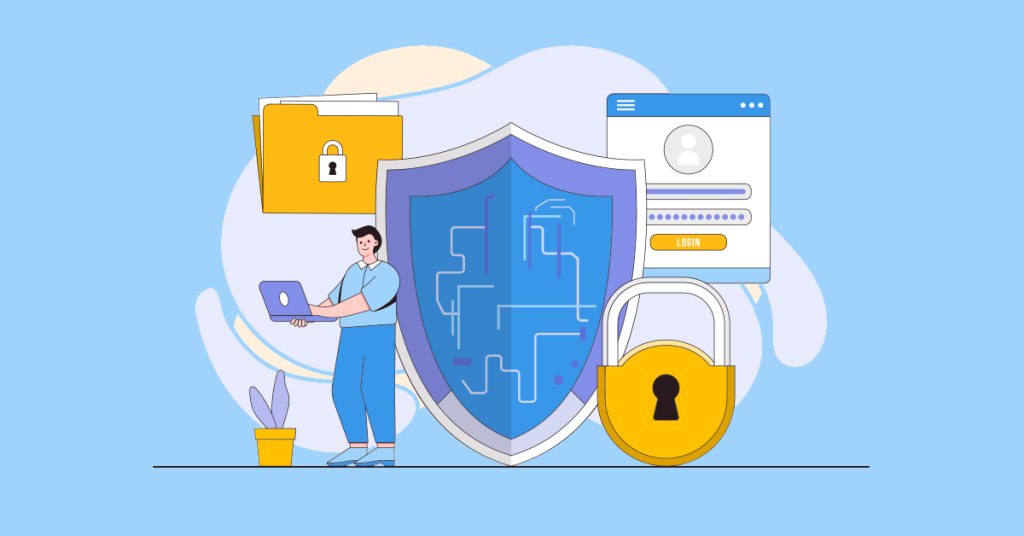In the digital expanses of the Internet, social media platforms serve as fertile territory for our personal and professional connections. They are places where we can encounter new ideas, interact with diverse individuals, and cultivate relationships.
Yet, these platforms are not free of threats, risks, and scams. Ensuring security and privacy amidst the sea of e-connections is crucial.

One solid approach to achieving this is through the use of people lookup tools. These tools, when cleverly utilized, can effectively protect users against virtual threats by verifying identities, blocking unwanted contact, and avoiding scams.
Understanding People Lookup Tools
People lookup tools, sometimes referred to as people search engines, are tools designed to help users find detailed information about others online. They essentially serve as background check tools, pulling data from multiple sources to create comprehensive profiles of individuals.
Information can include significant public records, social media profiles, professional data, or any digital breadcrumbs linked to a person’s online persona.
Most people lookup tools that are effortless to use. All you need is the person’s name, username, email, or phone number.
Once you provide this, the tool scours the virtual realm to retrieve and display detailed insights about the person behind the data. While they are primarily used for searching people, these platforms can also be excellent defenses against online lurking dangers.
Common Scams and Frauds on Social Media Platforms

Social media platforms have become a breeding ground for various scams and frauds, targeting unsuspecting users who often fall victim to these deceptive practices. Here are some of the most common scams and frauds seen on social media, along with relevant statistics:
1. Phishing Scams
Phishing scams involve fraudulent attempts to obtain sensitive information, such as usernames, passwords, and credit card details, by posing as a trustworthy entity.
A 2020 report by the Anti-Phishing Working Group (APWG) revealed that the number of phishing attacks in the first quarter of 2020 was 39% higher than the previous quarter, with a notable increase in attacks related to the COVID-19 pandemic.
2. Fake Promotions and Giveaways
Scammers create fake promotions and giveaways that require users to share personal information or pay a fee to participate, with no intention of delivering the promised rewards.
According to a study by the Better Business Bureau (BBB), fake prize and sweepstakes scams ranked as the second riskiest scam in 2020, with a median loss of $1,000 per victim.
3. Impersonation Scams
Fraudsters create fake accounts impersonating reputable individuals, organizations, or brands to deceive users into sharing personal or financial information.
A 2021 report by the Federal Trade Commission (FTC) indicated that impersonation scams were the most common type of fraud reported in the first quarter of 2021, comprising 47% of all reported fraud.
4. Investment and Money-Making Scams
Scammers use social media to promote fraudulent investment opportunities, pyramid schemes, and money-making ventures that lure victims into financial loss.
The Federal Bureau of Investigation (FBI) reported a significant increase in the number of complaints related to investment scams, with losses exceeding $8 billion in 2020.
5. Romance Scams
Fraudsters create fake profiles on social media platforms to establish romantic relationships with users, ultimately exploiting their emotions and trust for financial gain.
According to the FTC, reported losses to romance scams reached $304 million in 2020, making it the costliest scam category for that year.
6. Clickbait and Fake News
Description: Clickbait and fake news articles are used to drive traffic to fraudulent websites or spread misinformation, often leading to financial scams, malware installations, or data theft.
Statistic: A study by the University of Oxford revealed that social media platforms are significant vectors for the spread of disinformation, with fraudulent content reaching millions of users worldwide.
In conclusion, the prevalence of scams and frauds on social media platforms underscores the importance of user vigilance and awareness.
By staying informed and exercising caution when engaging with content and offers on social media, users can help mitigate the risk of falling victim to these deceptive practices.
Role of People Lookup Tools in Enhancing User Security On Social Media Platforms

In exploring the notion further, we discover that a people finder tool plays a key part in protecting privacy and improving social media security. They help users confirm or disprove the identities of those they meet online.
In particular, it can play an important role in combating the practice of catfishing- up a fake social media profile for purposes of deception.
Besides, these tools can catch out scammers or cyberstalkers from patterns of suspicious user activity. They can also help create a method for deterring unwelcome contact; bringing our user community one step closer to a safer, more regulated net environment.
Identifying Fake Profiles
In today’s digital world, creating a fake social media profile is as simple as ABC. Disturbingly, these false accounts can be used for malicious activities like identity theft, online scams, or bullying. Thanks to people lookup tools, we can easily identify these deceptive profiles.
By cross-referencing details, they can give us a heads-up about accounts that don’t seem to belong to actual people.
People lookup tools can be quite handy in identifying fake profiles on social media. Here’s how they typically do it:
Phone Number Lookup
A reverse phone lookup is a handy tool to verify a person’s identity. If the phone number linked with the profile is legitimate and can be interlinked with other reputable sources, then it might be a genuine profile.
Email Address Verification
Similar to phone number checks, an email verification can also provide clues. Unused or recently made email addresses might also tip off that a social media profile is fake.
Consistency Checks
The primary way these tools work is by conducting consistency checks. They will pull up all available data related to a name, email, or username. For instance, if the person in question is “John Doe” on Facebook, but there’s a suspicious lack of data about “John Doe” elsewhere on the internet, it could be a sign of a fake profile.
Reverse Image Search
Sometimes, people who create fake profiles use images sourced from the internet. People lookup tools frequently have reverse image search capabilities. They can cross-reference profile images and alert if the same picture has been used elsewhere, possibly under a different name.
Cross-checking Personal Information
The tools cross-check personal information to ensure it’s not made up or unreliable. They check whether the listed education, location, work, etc., match up with public data, like professional websites, directories, or databases.
Data Analysis
Data analysis can reveal patterns that might suggest a profile is fake. For instance, if an account has been recently created and yet has thousands of friends, or if the account constantly generates posts but doesn’t interact with others, these can be red flags.
Background Checks
Social media profiles only show us the information others want us to see. That’s the beauty and the challenge. It might be difficult to authenticate the details provided on someone’s profile, which can lead to the risk of falling for impersonators or fraudsters.
However, a people lookup tool allows us to conduct a background check, providing a fundamental mechanism to verify the person behind the profile. This way you can be sure you’re interacting with genuine people on social media, not bots or individuals with malicious intent.
Putting a Restrain on Cyber Stalking
Ever heard of ‘catfishing’? It’s when someone lures you into a relationship by means of a fictional online persona. Cyberstalking, too, is an unfortunate reality of today’s digital age.
Running a background check can help identify inconsistencies in someone’s identity, making it easier to recognize potential catfishing or cyberstalki
Promoting Business Security
People lookup tools aren’t just about personal safety; they’re equally important for businesses. Businesses can use these tools to sift through potential employees or clients’ profiles, promoting greater security and enabling a more informed decision-making process.
Verifying details helps to cut down the risk of fraud or deception, ensuring the business realms stay as secure as possible.
Securing Online Dating
People lookup tools are becoming increasingly popular in online dating landscapes. These tools can authenticate profiles, proving crucial in safeguarding users from any potential dangers. They act as digital safety nets, verifying the identity of users and providing a safer online dating experience.
People lookup tools are steadily transforming the way we ensure security and privacy on social media platforms. They provide us with unparalleled support in our constant battle against online hazards, allowing us to enjoy our digital social interactions to the fullest.
As technology advances, we can expect these tools to get even better at solving our online security concerns. Now, whether it’s about confirming an unfamiliar friend request, doubtful business proposition, or a newly found love interest online, we can count on people lookup tools to keep us safe.
Comparative Analysis of Various Lookup Tools
Similar to any other digital tool, people lookup tools offer different capabilities depending on the sophistication of their design and algorithm. Some renowned tools in this encompass are Spokeo, TruthFinder, and Instant Checkmate.
CocoFinder is popular for its comprehensive insights. Its algorithms cross-reference millions of data points to provide a detailed user report. If you’re looking for insights extending beyond basic personal information, CocoFinder might be your go-to tool.
TruthFinder offers a variety of features including digital footprint analysis and dark web scan. The tool is competent in checking criminal records, which can provide an additional layer of safety for users.
Instant Checkmate, on the other hand, prides itself on accuracy and precision. It extracts data predominantly from public records, making its database trustworthy and reliable.
Each of these tools offer free basic searches, but for more comprehensive reports, they require a paid subscription.
Advantages of People Finder Tools for Social Media Users
When it comes to staying safe on social media, people finder tools can be incredibly useful for safeguarding your online presence. Let’s take a look at some of the key advantages of using these tools:
1. Identity Verification
With people finder tools, you can verify the identity of individuals you encounter on social media platforms, helping you avoid interacting with potential scammers or fraudsters who may be using fake profiles.
2. Background Checking
These tools enable you to conduct background checks on individuals, allowing you to confirm their credentials and ensure they are who they claim to be. This can be particularly valuable when connecting with new people on social media.
3. Contact Information Validation
People finder tools can help validate contact information, such as email addresses and phone numbers, associated with social media profiles. This can be crucial for distinguishing between legitimate users and those with dubious intentions.
4. Fraud Prevention
By using people finder tools, you can proactively identify and avoid potential fraud, as these tools can reveal any suspicious or fraudulent activity associated with an individual’s online presence.
5. Personal Safety
These tools contribute to personal safety by allowing you to assess the trustworthiness of individuals you engage with on social media, helping to protect your personal information and overall online safety.
6. Family and Friend Connections
People finder tools can also help establish connections with family members, long-lost friends, or other individuals you trust, enriching your social media experience with genuine and meaningful connections.
By leveraging people finder tools, you can enhance your online safety on social media platforms and make informed decisions about the individuals you interact with. These tools provide a layer of protection and peace of mind, empowering you to navigate the digital landscape with confidence and security.
Conclusion
In conclusion, people lookup tools have emerged as a powerful ally for social media users, helping them navigate the digital world more securely. By verifying identities, blocking unwelcome contact, and assisting users in avoiding scams, these innovative tools significantly enhance social media security.
Navigating through the sea of social media with these tools by your side can make your online journey safer, allowing you to connect with peace of mind. Remember, when it comes to online safety, knowledge and vigilance are your best guards!


